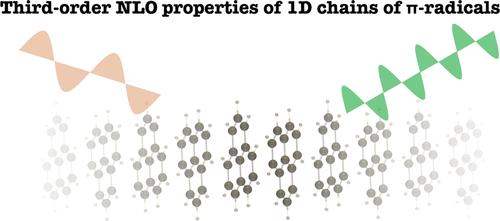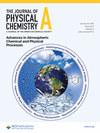Theoretical Study on the Correlation between Open-Shell Electronic Structures and Third-Order Nonlinear Optical Properties in One-Dimensional Chains of π-Radicals
IF 2.7
2区 化学
Q3 CHEMISTRY, PHYSICAL
引用次数: 0
Abstract
This paper theoretically investigated the correlation between the open-shell electronic structure and third-order nonlinear optical (NLO) properties of one-dimensional (1D) stacked chains of π-radicals. By employing the finite N-mer models consisting of methyl or phenalenyl radicals with different stacking distances, we evaluated the average and standard deviation of diradical characters yi for N-mer models of π-radicals (yav and ySD). Then, we estimated these diradical characters at the limit of N → ∞. These y-based indices were helpful in discussing the correlation between the open-shell electronic structures and the second hyperpolarizability per dimer at the limit N → ∞, γ∞ for the 1D chains with stacking distance alternation (SDA). The calculated γ∞ values and the polymer/dimer ratio γ∞/γ(N = 2) were enhanced significantly when both the stacking distance and SDA are small. We also found that the spin-unrestricted long-range-corrected (LC−)UBLYP method with the range-separating parameter μ = 0.47 bohr–1 well reproduced the trend of γ∞ of this type of 1D chain estimated at the spin-unrestricted coupled-cluster levels. The present study is expected to contribute to establishing the design guidelines for future high-performance open-shell molecular NLO materials.

一维π-放射性链中开壳电子结构与三阶非线性光学特性相关性的理论研究
本文从理论上研究了π自由基一维(1D)堆积链的开壳电子结构与三阶非线性光学(NLO)特性之间的相关性。通过采用由具有不同堆叠距离的甲基或苯丙烯基组成的有限 N-聚合物模型,我们评估了 π-自由基 N-聚合物模型的二维特征 yi 的平均值和标准偏差(yav 和 ySD)。然后,我们估算了 N → ∞ 极限时的这些二维特征。这些基于 y 的指数有助于讨论具有堆叠距离交替(SDA)的一维链在 N → ∞、γ∞ 极限下的开壳电子结构与每个二聚体的第二超极化率之间的相关性。当堆叠距离和 SDA 都很小时,计算出的γ∞值和聚合物/二聚体比γ∞/γ(N = 2)都显著增强。我们还发现,自旋无限制长程校正(LC-)UBLYP 方法的范围分离参数μ = 0.47 bohr-1 很好地再现了在自旋无限制耦合簇水平上估计的这类一维链的γ∞趋势。本研究有望为制定未来高性能开壳分子 NLO 材料的设计准则做出贡献。
本文章由计算机程序翻译,如有差异,请以英文原文为准。
求助全文
约1分钟内获得全文
求助全文
来源期刊

The Journal of Physical Chemistry A
化学-物理:原子、分子和化学物理
CiteScore
5.20
自引率
10.30%
发文量
922
审稿时长
1.3 months
期刊介绍:
The Journal of Physical Chemistry A is devoted to reporting new and original experimental and theoretical basic research of interest to physical chemists, biophysical chemists, and chemical physicists.
 求助内容:
求助内容: 应助结果提醒方式:
应助结果提醒方式:


